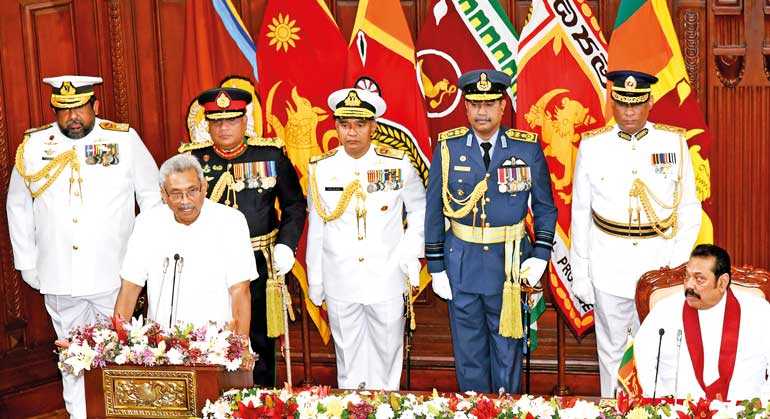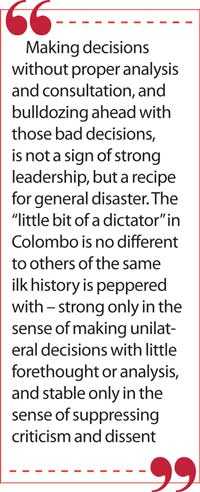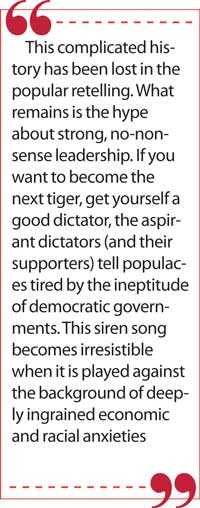Thursday Feb 12, 2026
Thursday Feb 12, 2026
Monday, 13 January 2020 09:31 - - {{hitsCtrl.values.hits}}

The decision to not remove presidential term limits from the 19th Amendment reportedly has the Rajapaksa brothers at loggerheads
by Tisaranee Gunasekara
“The obstinacy on which power is based is never so fragile as in the moment of its triumph.”
Italo Calvino (A King Listens)
On 7 December 2019, the Government of Gotabaya Rajapaksa and Mahinda Rajapaksa issued a circular granting a monthly allowance of Rs. 15,000 to executive grade officers in the public sector.
Exactly a month later, on 7 January 2020, the Government of Gotabaya Rajapaksa and Mahinda Rajapaksa issued another circular suspending that allowance.
No reasons given, though there is one that leaps to the eye – money. A candle is not meant to be burnt from both ends; no government can cut taxes and increase expenses without embroiling itself in a massive fiscal crisis.
Had this flip-flopping happened under the previous administration, there would have been howls of anger and condemnation, and rightly so.
No such cries are heard now, not even a murmur so far. 
On 25 November 2019, President Gotabaya Rajapaksa, in his first post-election interview, expressed his intention of renegotiating the Hambantota Port deal with China. “I will request them to renegotiate and come with a better (deal) to assist us,” he said. “Today, the people are not happy with that deal, we can think of one year, two years, five years, we have to think of the future, what will happen? So giving a small land for investment is a different thing. To develop a hotel or a commercial property is not a problem, that’s not an issue. But strategically important, economically important harbour, giving that is not acceptable. That we should have control. We have to renegotiate.” (Bharat Shakti – 25.11.2019)
Three weeks later, on 19 December 2019, President Gotabaya Rajapaksa informed a gathering of foreign correspondents in Colombo that there will not be any renegotiation of the Hambantota Port deal. “I am now not here to renegotiate the agreement as it is a commercial contract and I am not about the commercial aspect. But I am concerned about the security aspect as to whether there are any security lapses. That is what I am discussing with China.” (Xinhua – 20.12.2019).
A reversal half as bad would have earned the previous administration loads of derision, and rightly so.
But now, there is just silence.
In his maiden speech as President, Gotabaya Rajapaksa said, “As pledged in the manifesto, skills and knowledge will be the foremost factors considered in making various appointments in our administration. Meritocracy and technocracy should be promoted at all times.”
Last week, Upul Dharmadasa was appointed Chairman of the Civil Aviation Authority of Sri Lanka. Dharmadasa is a Lankan-American. As the owner of Upul Travel Services he has “won the hearts of thousands of Sri Lankan expatriates living in North America” (Aviation Voice – 8.1.2020). One of those hearts happened to belong to a Lankan American by the name of Nandasena Gotabaya Rajapaksa. The rest, as they say, is history.
In the same week, the father-in-law of Namal Rajapaksa and the mother-in-law of Rohitha Rajapaksa were appointed directors of Airport and Aviation (Services) Sri Lanka Ltd., according to a report in The Colombo Telegraph.
Did all three forward their applications to the special committee appointed by Gotabaya Rajapaksa to pick the best and the brightest for high posts? This is a meritocracy only if the merit in the meritocracy is understood in the Pali sense of “punya” (“ping” in Sinhala).
A little bit of a dictator is like a little bit of cancer
“We need a strong leadership; what we need is a little bit of a dictator,” Ashok Pathirage of Softlogic fame said in 2018 (Financial Times – 31.8.2018). Many of his fellow tycoons taking part in the International Chamber of Commerce-organised symposium called Fireside Chats (a term copied from FDR’s famous radio programs) agreed.
That wish has been granted. These and other business tycoons who flocked to Gotabaya Rajapaksa’s Viyathmaga extravaganzas have the leader of their choice.
Of course, you can’t have a little bit of a dictator any more than you can have a little bit of murder. That is not how power works. That apart, do we now have the longed-for policy consistency, the much-desired farsighted decision making?
During the election campaign, SLPP pledged to scrap Mangala Samaraweera’s fuel price formula. In late November and again in early December, the new subject minister pronounced the fuel price formula dead.
This month, the Secretary to the Treasury did a reversal and said that the formula will stay. “We have to have a formula to anyway to calculate fuel price, so there will be no change in the formula we have now. We will continue with this.” (The Sunday Morning – 5.1.2020)
Less than 48 hours later, that U turn was again U turned. A state minister tweeted a contradiction pledging that the Government will neither use the old formula nor create a new one. The Treasury Secretary has not responded, and neither has the subject minister.
So is the fuel price formula dead or alive?
This is policy consistency only in places where words mean their opposites.
“Action alone kept him alive,” Camus said of Hitler, “For him to exist was to act” (The Rebel). Action as the antithesis of thinking, action, any kind of action as the greatest good seems to be the R&R approach. 
Take the decree that ordered all banks and finance companies to give a one year moratorium for loans up to Rs. 300 million. That came out of the blue, literally. There were no discussions with the stakeholders, no study of how this measure would impact on the banks and finance companies already struggling under a slew of bank loans.
Just a written order in the name of President Rajapaksa and Prime Minister Rajapaksa.
The bankers expressed their concerns, taking care to do so ‘sotto voce’ and anonymous.
Consider the even more disastrous decision to remove the permit-requirement for the transportation of sand, gravel and soil. That decision too came from nowhere. Again there was no study of social and environmental implications, no consultation with the stakeholders. Just a Cabinet decision.
Illegal sand mining has escalated as a result, giving rise to public protests, especially in the north and the east. But these protests rarely get any coverage. When the hike in illegal sand mining results in more virulent floods, when the increase in quarrying and soil extraction causes deadlier landslides, the effects of the removal of transport permits will be felt, but it will not be talked about.
Take the slew of tax breaks given by the Government in November. The decrease in indirect taxes has had little or no bearing on the cost of living, which continues to soar, driving down both consumption and living standards. The previous Lankan experience indicates that business establishments are quick to pass the cost of any tax increase to the consumer and less willing to share the benefits of a decrease. To ensure that the benefit accrues to the consumer, the Government needs to be proactive, using a combination of persuasion and pressure (the latter via the Consumer Protection Authority). Since no such effort has been made by the R&R Government, the only effect of the VAT reduction will be to denude public finances, an inevitability the current crop of strong leaders seem utterly oblivious to.
Making decisions without proper analysis and consultation, and bulldozing ahead with those bad decisions, is not a sign of strong leadership, but a recipe for general disaster. The “little bit of a dictator” in Colombo is no different to others of the same ilk history is peppered with – strong only in the sense of making unilateral decisions with little forethought or analysis, and stable only in the sense of suppressing criticism and dissent.
After all, as history has proven over and over again, autocracies cannot make trains run on time. They just make sure that no one other than those directly affected know about the delays.
The controlling of reporting and reaction can happen directly, and indirectly. Either way, it ensures that instead of varying narratives, there is a single one. Thinking is unnecessary; choice is almost a crime. One nation, one people, one leader also translates to One Truth.
The good tyrant – from myth to reality
The myth of the efficient dictator is just that, a myth.
Most of the Third World lived under civilian or military dictators until the 1990s and all of them went from underdevelopment to further underdevelopment. The different experiences of the East Asian NICs (Newly Industrialising Countries) constitute not the norm but the exception to the norm. All four NICs had non-elected governments. This gave birth to the belief that rapid development needed the guidance of a wise and a benevolent dictator. The reality is otherwise. The NICs developed not because they had dictatorships but because of the geo-political environment created by the confluence of the Cold War, the Chinese Revolution and the Korean War.
The need to counter the socialist threat was one of the most important reasons behind the Marshall Plan which helped Western Europe to make an astounding recovering from the devastation of the Second World War. As Tony Judt pointed out in ‘Post War’, the Marshall Plan was an economic program aimed at averting a political crisis.
A similar situation prevailed in East Asia in the 1950s. The Chinese Revolution was in its early and dazzling stage and the West desperately needed economic success stories to counter its gathering influence. So a version of Marshall Plan was created and implemented, especially in South Korea and Taiwan. Generous aid packages were provided to jump-start the economies, and markets were guaranteed for exports. Americans, so hostile to land reform in the rest of the world, championed sweeping land reforms in South Korea and Taiwan, which did much to settle the “peasant question” and combat rural poverty.
This complicated history has been lost in the popular retelling. What remains is the hype about strong, no-nonsense leadership. If you want to become the next tiger, get yourself a good dictator, the aspirant dictators (and their supporters) tell populaces tired by the ineptitude of democratic governments. This siren song becomes irresistible when it is played against the background of deeply ingrained economic and racial anxieties.
This was what happened in Sri Lanka.
Almost two months of R&R rule, and what does Sri Lanka have to show for it? A whole lot of painted walls? A mandatory playlist of 1000 approved songs for private bus operators? A ticking environmental time-bomb? A looming fiscal disaster?
Gotabaya apologists argue that he can’t take us to the Promised Land because the 19th Amendment has rendered the presidency powerless. The 19th Amendment cannot be blamed for the constant flip-flopping, for the many ill-considered decisions. It is not because of the 19th Amendment the President has been unable to control skyrocketing rice prices. His solution was to make surprise visits to several economic centres and impose price controls on retailers without touching the three rice-mill oligarchs who control the market.
Parliamentarian Wijedasa Rajapaksa has tabled two private members motions to disembowel the 19th Amendment and make the President omnipotent again. There is one omission – the amendments do not propose to remove presidential term-limits. Understandably. How else to prevent Mahinda Rajapaksa from edging out little brother Gotabaya by forcing a presidential election at the earliest opportunity, and contesting it? According to media reports, the two brothers are at loggerheads over the issue. Mahinda Rajapaksa is unlikely to twiddle his thumbs until Gotabaya Rajapaksa renders the Prime Minister post powerless and concentrate all powers in presidential hands.
Just before the Presidential Election, the Economist Intelligence Unit warned that a Gotabaya Presidency is unlikely to bring about either long term political stability or economic development. The causes identified for this negative outcome were mishandling of ethno-religious relations and the weakening of democratic freedoms. 1
But instability is already here, born of paucity of vision, absence of thinking and planning, and sibling rivalry. Add the effects of mishandled minority relations and mishandled dissent to it – and the future looks as bright as a supernova.
http://country.eiu.com/article.aspx?articleid=1818220365&Country=Sri%20Lanka&topic=Politics